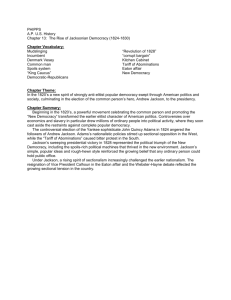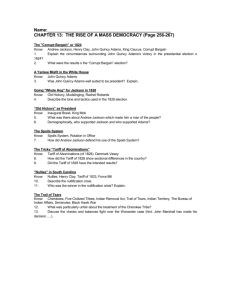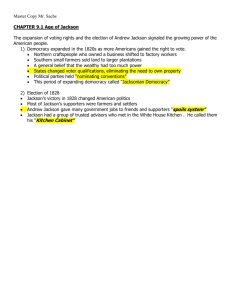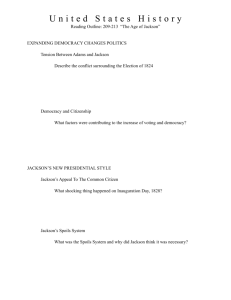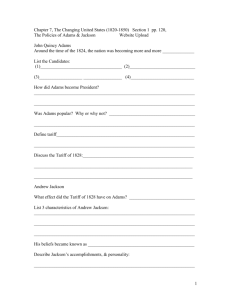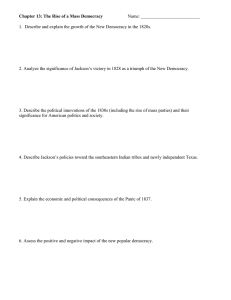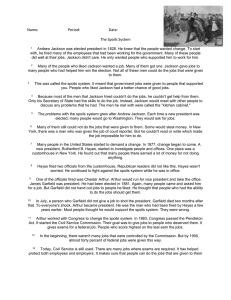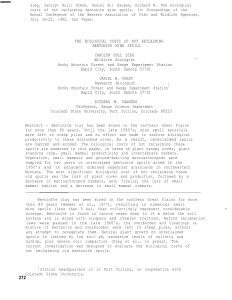Stuff The Rise of Jacksonian Democracy
advertisement
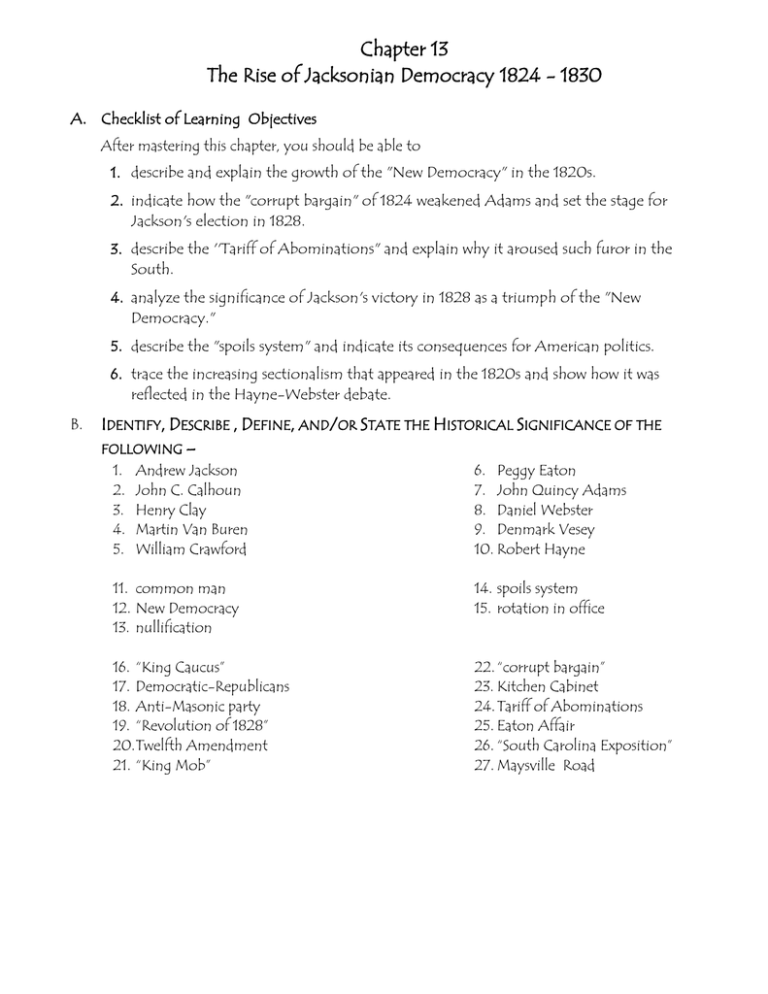
Chapter 13 The Rise of Jacksonian Democracy 1824 - 1830 A. Checklist of Learning Objectives After mastering this chapter, you should be able to 1. describe and explain the growth of the "New Democracy" in the 1820s. 2. indicate how the "corrupt bargain" of 1824 weakened Adams and set the stage for Jackson's election in 1828. 3. describe the ''Tariff of Abominations" and explain why it aroused such furor in the South. 4. analyze the significance of Jackson's victory in 1828 as a triumph of the "New Democracy." 5. describe the "spoils system" and indicate its consequences for American politics. 6. trace the increasing sectionalism that appeared in the 1820s and show how it was reflected in the Hayne-Webster debate. B. IDENTIFY, DESCRIBE , DEFINE, AND/OR STATE THE HISTORICAL SIGNIFICANCE OF THE FOLLOWING – 1. 2. 3. 4. 5. Andrew Jackson John C. Calhoun Henry Clay Martin Van Buren William Crawford 6. Peggy Eaton 7. John Quincy Adams 8. Daniel Webster 9. Denmark Vesey 10. Robert Hayne 11. common man 12. New Democracy 13. nullification 14. spoils system 15. rotation in office 16. “King Caucus” 17. Democratic-Republicans 18. Anti-Masonic party 19. “Revolution of 1828” 20.Twelfth Amendment 21. “King Mob” 22. “corrupt bargain” 23. Kitchen Cabinet 24. Tariff of Abominations 25. Eaton Affair 26. “South Carolina Exposition” 27. Maysville Road C. Glossary To build your social science vocabulary, familiarize yourself with the following terms. 1. constituents - The body of voters or supporters in a district, regarded as a group “His Tennessee constituents began to talk of running him for the presidency." 2. divine right - The belief that government or rulers are directly established by God. "America was now witnessing the divine right of the people." 3. hard money - Coins, as distinguished from paper money. "They sought substitute hard money for bank notes." 4. deference - The yielding of opinion to the judgment of someone else. "The deference, apathy, and virtually nonexistent party organizations gave way to boisterous democracy." 5. subversive - Tending to corrupt, overthrow, or destroy something established. "This procedure was now condemned as subversive of democracy." 6. clique - A small, exclusive, and snobbish circle of people. "The voters turned against the candidate, who had been selected by the congressional clique." 7. puritanical - Extremely or excessively strict in matters of morals or religion. "The only candidate left was the puritanical Adams." 8. usurpation - The act of seizing, occupying, or enjoying the place, power, or functions of some- one without right. "Adams was smarting under charges of 'usurpation.' " 9. political plums - Choice, desirable offices or favors. "If the president would not reward party workers with political plums, why should they labor?" 10. mudslinging - Malicious, unscrupulous attacks against an opponent. "Mudslinging reached a disgraceful level." 11. bare-knuckle - Hard, unrestrained, brutal. "The new mass electorate had a taste for bare- knuckle politics." 12. machine - A political organization, often controlled through patronage or spoils. "In New York and Pennsylvania, well-greased machines were operating. 13. spoils - Public offices given as a reward for political support. "The emphasis was more on spoils than on responsibilities.” 14. henchmen - Political supporters or followers. "Jackson believed that the swiftest road to reform was to bring in his own trusted henchmen." 15. incumbent - The person currently holding an office. "The open break with the incumbent.”

